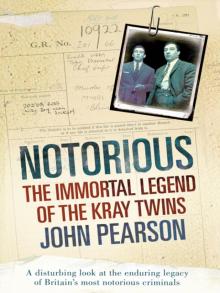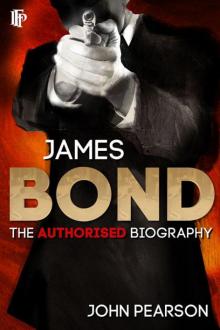- Home
- John Pearson
Biggles Page 10
Biggles Read online
Page 10
Biggles’ decisiveness, his self-control and his ability to think clearly in a crisis, were not lost on Colonel Raymond, and it was shortly after the Marie Janis business that Biggles finally threw in his lot with the British Secret Service. It was something that he was always reticent about. This was partly habit — no secret agent worth his salt feels happy throwing off the veil of secrecy. But in Biggles’ case, I feel that there was something more than this, a real contradiction that ran through his character and troubled him.
For the fact was that Biggles, thanks to heredity and the strange traumas and training of his childhood, was ideally suited to being a spy. Even as a child he had learned to mask his feelings from his father. His adventures in the jungles and bazaars of India had taught him to blend into any background and had given him a taste for secrecy and personal adventure. Then, as he had to accommodate himself to life at Malton Hall, Biggles the loner was again disguising all his fantasies and feelings in his desperate attempts to conform in a minor English public school.
This was what Colonel Raymond — with uncanny insight — must have realised. What he failed to see was the other side of Biggles, the side of him Algy Lacey called ‘the good Boy Scout’ — the fearless, incorruptible, straight-talking character who pretended to be far simpler than he was. This side of Biggles was at its best in the middle of a dogfight, for as he once said, ‘A Camel, blue skies and plenty of Huns are the height of my ambition, and I hope to find them all in France.’
Generally he did, but early in the spring of 1918 he became crucially involved in the strange adventure with the British Secret Service which took him away from 266 for several months, months during which he found himself playing the distasteful part of a double agent against the background of the Middle East. He played it brilliantly, as one can see from Captain Johns’ account of the mission which he entitled — somewhat to Biggles’ chagrin it appears — Biggles Flies East. Indeed, Biggles became enrolled in that exclusive band of British agents who have actually been awarded an Iron Cross by the Germans. But Biggles would always shy away from telling us about the affair. ‘Messy business,’ he would say, and light a cigarette as if the whole adventure were discreditable. For him perhaps it was, but in fact it probably did more to help the Allied war effort than any of his battles in the skies. That might have worried him as well.
Biggles’ part in the affair rested originally on his close resemblance to an Englishman called Brunow, who not long before was cashiered from the R.F.C., and had made contact with the enemy to work as a German spy. Colonel Raymond, who had been observing Brunow closely since his disgrace, finally convinced the members of the British Air Staff Intelligence of the possibilities of substituting one of his own men for Brunow — and selected Biggles for the task.
It was a long and hazardous affair. (Readers who wish to study it in its complexity are referred to Captain Johns.) But it involved Biggles in the task of infiltrating German Intelligence in Palestine, and he did this so effectively — and in the process flew a captured Sopwith Pup so skilfully — that he was awarded the Iron Cross I have referred to. (He always pretended that the award embarrassed him; nevertheless, he kept the medal and Lord Lacey tells me it was among his effects when he died.) Throughout this mission Colonel Raymond was in Cairo, and for a period Algy worked with him, specially seconded from 266 to provide back-up support for Biggles in the field. Largely thanks to Biggles, the whole German effort to involve the Arabs in a diversionary revolt against the British was aborted.
Apart from its place in history, this mission to Palestine is interesting for the light it throws on the development of Biggles’ character. It was his first real chance to demonstrate his true skill as a double agent, and he exhibited the same fearlessness and iron nerve that he had shown in combat with the enemy in France, and the whole adventure shows that Biggles had by now become a man of fairly ruthless cunning when the need arose.
But despite his success, Biggles affected to dislike the Middle East and the intrigue and spying that he found there. ‘The whole area is rotten with the canker of espionage,’ he said — forgetting that he was no mean hand at espionage himself — and he told Raymond that he could hardly wait to return to battle on the Western Front, ‘and the wholesome fighting in the air’.
All this apart, this mission to the Middle East had one further memorable feature — it brought Biggles face to face with the man who would be his bitterest opponent in the years ahead, the Prussian known as Hauptmann Erich von Stalhein. Biggles remembered him in those days as ‘tall, slim and good-looking in a rather foppish way’, despite the double duelling scar disfiguring his cheek. He had recently been wounded with his regiment in France and was still limping and using a stick. From the moment Biggles first clapped eyes on him, he found something sinister and threatening in this dark-haired Prussian with the monocle and brooding eyes.
Von Stalhein was acting as Chief of Staff Intelligence to the incompetent Count von Faubourg, Station Commander of the German air station at Zabala where Biggles found himself. He never had much difficulty tricking Faubourg, but from the start von Stalhein was another matter. Biggles realised von Stalhein was suspicious of him. ‘He sensed that I was phoney. Anybody else would have had me shot at once, but that was not the way von Stalhein operated. You see, he was an old school Prussian officer, and he still adhered in those days to the rules of the game — fair play and all that. Mind you, he changed his ideas somewhat in the years ahead, but although von Stalhein proved to be the most diabolical opponent I’ve ever met, and cunning as a snake, he always managed to remain something of a man of honour.’
In Palestine this proved to be very much the case, with Biggles and von Stalhein acting out a deadly duel of wits, in which the Prussian never quite succeeded in discovering the proof of Biggles’ double-dealing. Nor, one must add, did Biggles ever manage to unmask von Stalhein when the tables turned, and the Prussian — already a virtuoso master of disguise — played out the part of the commanding El Shereef, elusive as the wind as he rode behind the British Lines on his magnificent horse. By the end of their encounter Biggles and von Stalhein had clearly recognised each other as the lifelong adversaries they would prove to be, and in a strange way they seem to have valued each other. They and they alone had been a match for one another. They had been the true protagonists in this sinister affair, and when it ended — and it seemed as if von Stalhein must have perished when his plane was hit by British anti-aircraft fire — Biggles felt, not elation, but a curious regret. Yet even then, something must have told him that the von Stalheins of this world are not killed that easily, and that somehow he would meet him later on. But before he could learn the truth about von Stalhein’s fate, Biggles was back at Maranique with Algy where, to his relief, life and death were cleaner and less complicated than in the cess-pit of the Middle East.
For Biggles the last months of the war passed rapidly, as the routine of combat flying with 266 continued. The risks and the adventures were still there, but already, so it seemed, the pioneering days of air fighting were behind him. It was a life of regular patrols, reconnaissance, and aerial support for bombing raids. Biggles, who was now one of the veterans of the R.F.C., could have moved on to take command of a fresh squadron of his own, but he resisted this, even when promoted Major, late that summer. He was not interested in command — nor, for that matter, in pursuing fame and glory for their own sake. (His inborn aversion to publicity explains why he never allowed himself to be made into one of the wartime ‘aces’ by the popular press. He always insisted it was ‘tasteless’ to boast about the number of enemy planes he had shot down, and never would reveal how many ‘kills’ were to his credit.)
He was wounded once that summer — caught in the shoulder by a bullet from one of von Kirtner’s triplanes in a surprise attack on the airfield at Maranique. He was furious at this. ‘If I’d been in the air, I’d only have had myself to blame, but there I was standing on the tarmac and all I heard was the rattle of ma
chinegun fire, and then I woke up in hospital.’ It was officially a ‘Blighty wound’ — qualifying for a month or two of easy convalescence back in Britain — but he convinced the doctors that this wasn’t necessary, and was up flying in a fortnight. Somehow he learned which aircraft from von Kirtner’s circus was responsible for the attack. It had a blue and white striped fuselage, and according to Wing Intelligence was flown by the well-known German ace, Graf von Ranke. From then on, Biggles waged a personal vendetta. Every time he flew he kept his eyes skinned for the Fokker triplane with the blue and white striped fuselage, but it seemed to be eluding him. Algy saw it once in a large formation north of Lille.
‘You didn’t get the blighter, did you?’ Biggles asked anxiously.
Algy shook his head.’ Sorry, old scout, I missed him.’
‘Thank God for that,’ said Biggles fervently. ‘I’ve still got something to settle with the Graf. I wouldn’t have forgiven you if you’d robbed me of that satisfaction.’
In the old days, this sort of humourless desire for revenge would have been unthinkable in Biggles, but the long dragging agony of war was changing him. So had the treachery of Marie Janis, and the intrigue and sordidness of his mission to Palestine. Had it not been for Algy, it is by no means certain what would have happened, with the grim obsessive mood that seemed to have overtaken Biggles now. But Algy helped to keep him human, for Algy had what Biggles lacked — a real sense of humour — and he would always make fun of him if he saw him getting too wrapped up in himself.
‘Biggles, old son,’ he would say, ‘you’re getting boring.’ And Biggles, who would have jumped on anybody else who spoke like this, would generally grin sheepishly and say, ‘Sorry Algy. Didn’t realise. I’ll have to watch it.’
But despite Algy’s influence, Major Mullen started to get worried about Biggles by the end of summer, and when Biggles was promoted Major, and awarded the D.S.O., he did his best to have him seconded back to England for a period with a training squadron. When Biggles found out he was furious, and finally had the order changed. But the damage had been done. The rumour had got round that Biggles was beginning to crack up, and he, in his pig-headed way, was set to prove that he was doing nothing of the sort.
This mood of his grew worse when, early in September, news arrived about his brother Charles. He had been killed with his battalion on the Somme, and although Biggles had never really liked him, he convinced himself he had a duty to avenge his brother’s death.
Algy did his best to talk sense into him — to no avail. Biggles was still seeking Graf von Ranke’s Fokker, but as well as this he now believed he had a private battle with the German Air Force. Little else mattered to him, and although his flying was as masterful as ever he started taking risks that he would never have dreamt of doing earlier. Other members of the Squadron started to fight shy of flying with him, but this never seemed to worry Biggles — and Algy always kept an eye on him.
Then came reports that Graf von Ranke’s Fokker had been seen again. Wing Intelligence confirmed that the Graf was still piloting the aircraft, and Biggles sought him like a hunter for his prey. Twice he missed him, and then finally one autumn morning he and the Squadron were on support patrol, deep over enemy territory, when they were pounced upon by twenty enemy aircraft. They were Fokker triplanes with the markings of von Kirtner’s circus, and in the midst of them Biggles suddenly made out a blue and white striped fuselage.
This was the moment he had waited for for months, and even as he gripped the triggers of his Vickers guns and hurled his Sopwith Camel in between the milling aeroplanes towards von Ranke’s Fokker, he could feel the dull ache in his shoulder reminding him of his wound. His jaw was set, a red glow blazed before his eyes, and he could clearly see the leather helmet of the man he hated. Nothing else mattered now, and as he dived towards his enemy he took no notice of the other German planes around him, nor did he even bother now to glance behind him.
Despite his speed it seemed an age before he felt close enough to fire.
‘Swine,’ he kept muttering, ‘filthy low-down swine!’ He was scared of one thing only — that von Ranke might escape him. But the German must have realised his fate was sealed, for just before Biggles fired he turned in his cockpit, and Biggles saw fear on his face. Biggles squeezed the triggers, and a stream of flaming lead tore through the blue and white fuselage. A wing flew off, the aircraft keeled to one side, and as Biggles zoomed above the doomed aeroplane, he saw von Ranke’s body tumble from the cockpit and go hurtling down.
But Biggles’ vengeance was short-lived. While he was struggling with his bucking plane and trying to avoid the debris from his enemy, there was a crash and his instrument panel shattered. A cruel pain seared his left leg, and even as he swung himself around to see his new opponent, a fresh hail of tracer fire lashed the Camel’s fuselage. There was a triplane on his tail, diving down from the sun to avenge von Ranke in his turn. Biggles knew that he was finished — and only had himself to blame. Had he not been so desperate to kill von Ranke, he would not have made this elementary mistake. He made one wild attempt to get away, yanking at the joystick and kicking at the rudder bar, but the plane failed to respond and the pain in his leg was now excruciating. Another blast of tracer hit the aircraft and it began to burn, then fell into a spin. He felt himself going down and down, and knew that he would crash.
Almost by instinct now, he made one final frenzied effort to wrench the aircraft from its spin — and miraculously it began to work. The engine was still functioning but he was barely more than 100 feet above a wood. Once more he pulled the joystick, but the plane continued on its downward path. A row of poplars rushed towards him, and he just had sense enough to raise his one undamaged leg up to his chin, fold his arms across his face, and await the impact.
There was a horrendous crash, but the branches of the trees had dulled the impact, and more by instinct now than anything, Biggles clawed his way from the wreckage — just in time. As he stumbled from the plane the petrol tank ignited and in seconds what had been a Sopwith Camel was a blistering inferno.
He tried to run, but his damaged leg buckled beneath him, and he had to crawl to get as far away from the blaze as possible. He pulled off his blood-stained goggles, and as he did so saw a group of men running towards him. They were wearing field grey, and silently surrounded him. So this was it. There was nothing he could do to avoid spending the remainder of the war in a German prison camp — if he ever got there in one piece. For, as he raised his hands and tried to struggle to his feet, one of the Germans came towards him, kicked him in the side and shouted, ‘Schweinhund flieger!’ Biggles recoiled with the pain but managed to bite back his cry. The German raised his foot to kick again, but a command rang out, and he turned away. Biggles saw a slim young officer who had just got out of a Staff car. He had the Iron Cross at his neck, and as he walked towards the troops they drew themselves erect, and stood firmly at attention.
The officer saluted Biggles.
‘Bad luck,’ he said in English. ‘Are you in any pain?’
Biggles shook his head. ‘A scratch,’ he answered, ‘nothing more.’
The officer continued to regard him with an expression of uncertainty upon his face.
‘Well,’ said Biggles through his teeth, ‘let’s get it over with. Perhaps one of your men would help me. I’ve always wondered what the inside of your prison camps was like.’
At this the German smiled and shook his head.
‘I don’t think that is necessary,’ he said.
‘Why not?’ said Biggles through his pain. ‘I don’t understand.’
‘An Armistice was signed an hour ago. I shall do my best to make arrangements to have you repatriated as soon as possible.’
Either from loss of blood or sheer relief, Biggles fainted.
4
Peace
‘So what do you propose to do, old fruit?’ asked Algy ruminatively.
‘Dashed if I know, and that’s a fact,’ said Bi
ggles, sipping his third pink gin that morning. ‘Had thought of trying to stay on. The old country’ll always need an air force, I suppose, although you wouldn’t think so from the way they’re treating us. Breaking up the Squadron like this, slinging the aircraft on the scrap-heap — and the pilots too! Now that we’ve won the war for them, the blasted politicians think they can treat us all like so much obsolete equipment. Frankly, old boy, it makes me sick!’
Biggles glowered through the window of the Mess at Maranique as rain swept across the airfield. The Armistice was three weeks old, and apart from a dismantled Sopwith Camel on the runway there was no sign that this had ever been one of the most active combat stations in the war. Mahoney was already off on leave in Paris, and several of the other pilots in 266 Squadron had opted for a swift return to England in their eagerness to leave the war behind them. Biggles would probably have joined them, but his leg wound had confined him to a hospital bed at Base for the last fortnight, and he was still on crutches. The leg was on the mend, but his spirits remained distinctly low. Algy had stayed behind to be with him, but even his devotion was becoming just a little strained by Biggles’ bitterness.
‘You really had considered signing on?’ asked Algy.
Biggles shrugged his shoulders with impatience.
‘I talked it over briefly with the CO., but he wasn’t hopeful. He said he’d recommend me — which was nice of him, all things considered — but he added that I’d have to drop back in rank to a Lieutenant, even if the Air Board took me on. He didn’t seem to think they would.’
‘Holy mackerel! They’d be off their flaming chumps to turn clown a flier with your record.’
Biggles shook his head.
‘By no means, Algy lad. Those Whitehall warriors don’t much care for individualists like us. It’ll be a peacetime air force, and they want nice safe reliable characters to serve in it. Which I imagine rules us out. Not that the situation really arises anyhow. This blasted leg wound stymies my chances. I’m already thinking that poor old Charles was not all that unlucky popping off like that. He’d had a dashed good war — and if this is peace, he’s best off out of it.’

 The Bellamy Saga
The Bellamy Saga Notorious: The Immortal Legend of the Kray Twins
Notorious: The Immortal Legend of the Kray Twins Learn Me Good
Learn Me Good James Bond: The Authorised Biography
James Bond: The Authorised Biography Painfully Rich
Painfully Rich The Profession of Violence
The Profession of Violence Biggles
Biggles Blood Royal: The Story of the Spencers and the Royals
Blood Royal: The Story of the Spencers and the Royals